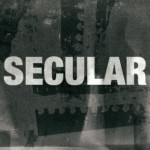This guest post was written by Luke Wilson.

Warning: Minor spoilers ahead! I say “minor” because there’s no plot points given away here, I’m just discussing an aspect of a character in the film, but I know some people (like me) don’t like to hear too much of anything before they see a film!
If you have seen the new Rogue One: A Star Wars Story, you will be familiar with a guy called Chirrut Îmwe. When he feels threatened or in times of peril when he wants protection, he repeats the short mantra: “I am one with the Force; the Force is with me.” Now, Chirrut is not a Jedi (apparently, actual spoilers in this link), but is a Force-sensitive “warrior monk” according to his Wiki (even though his skills displayed in the film look very Jedi-like!).
Despite not being in the “Jedi club,” this character shows a strong dedication to his faith in The Force and his belief in its protection and power in his life, even in those times where he had good reason to doubt, and even when he as actively encouraged to do so by his companions! But instead of thinking the Force had failed him, it strengthened his resolve and made him “pray” all the more in faith and trust that everything would be fine and that they’d be safe.
I couldn’t help but see the parallels in his “faith” and “prayer” to how our life as Christians ought to be concerning the work of the Spirit in and through us. I found this encouraging and it reminded me of an ancient Christian mantra-like prayer which is still prayed today by some Christians. This is the Jesus Prayer: “Lord Jesus Christ Son of God, have mercy on me a sinner.”
This prayer is short and repetitive much like the Star Wars Force prayer, and was also first introduced by a monk (though a hermit monk rather than a warrior monk!). From the history of the Jesus Prayer I once read, it was the quest of a young monk who wanted to fully understand Paul’s encouragement to “pray without ceasing” (1 Thess 5:15-18) and he came across a hermit who taught him this method.
The purpose of this Jesus Prayer, much like Chirrut Îmwe’s use of the Force prayer, is to constantly bring to mind and keep it focused on God at all times (“without ceasing)” until you embody the words and they have a deep effect on you and your mind. By praying “in the Holy Spirit” we seek to “build yourselves up on your most holy faith (Jude 1:20).
Sometimes people object to repetitious prayers such as the Jesus Prayer by citing the verse about not praying with “vain repetitions” (Matt 6:7). But is it vain? In this case, “vain” means something that is pointless or futile (as opposed to meaning “self-centered or narcissistic,” which is the more common understanding these days). If we look a couple of verses earlier (Matt 6:5), there’s a link with not being like “the hypocrites” who stand in the street making themselves seen when praying (and thus get their reward).
With that in mind, I’d argue that set prayers are not vain in the slightest because, when you are praying to God, how can that ever be futile? What makes it futile, and the reason Jesus spoke against it, was because they were praying to idols or, if they were Jewish, they were being hypocrites by overlooking the fact God was walking among them! (Jn 5:38). Another reason for prayers becoming vain is when they’re not from the heart. Prayer is about connecting with God, knowing and meaning what you say, and praying without becoming discouraged, as Jesus tells his disciples in Luke 18:1.
But more than just praying and keeping focused on God, we need to be as Jesus said: at one with each other and totally united with the Spirit (John 17:11,22).
So I propose an adaptation to the film quote to make it relevant to our faith: I am one with the Spirit, the Spirit is with me.
This encapsulates the teachings of Jesus and the outlook and mindset we ought to have as Spirit-filled Christians: as children of God (Rom 8:14), to be guided by the Spirit (Gal 5:25) in our new life led by the Spirit in us (Gal 2:20), because ultimately, “anyone united to the Lord becomes one spirit with him” (1 Cor 6:17).
Chirrut Îmwe’s mantra about The Force has resonated with fans the world over, and I can see why after watching the film–though I am viewing it through my own lens of faith. But wouldn’t it be great if people would call on the only true “force” in this world instead, in order to be saved, protected, and made at one with (Rom 10:13; Ps 121:1-2)?
May we enter this new year at one with the Spirit, never forgetting that the Spirit is with us.
 About Luke Wilson
About Luke Wilson
Luke has a BA (hons) in Biblical Studies and Theology and enjoys studying theology and reading the writings of the Apostolic Fathers in his free time, when not writing things for his own blog, That Ancient Faith.















